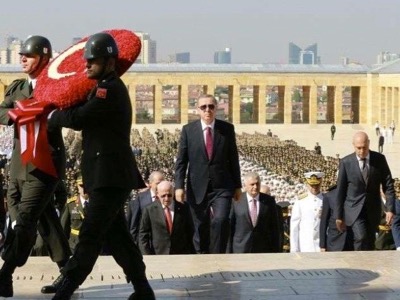For Savvas Kalèdéridès, Turkey is reacting to changes that may take effect at its border, almost following changes at home. The evolving Kurdish issue pushes Turkey further away from the West, bringing her closer to Russia.

We have repeatedly written it, several times now, and certainly before everyone started talking about it, that very soon in the Middle East, particularly in Mesopotamia, everything is going to change - in balance of power at state borders.
The time is now five to midnight and when midnight strikes Iraq’s borders will be changed and Syria transformed into a federal state.
It is the United States and Russia that will determine outcome on the ground and in the diplomatic backdrop of this process, which will determine the region’s future, perhaps for centuries. While the factor from which each is trying to extract a profit, to ensure their own strategic interests is the Kurdish issue.
Furthermore, Israel should play a meaningful role (principally under the table). Israel which according to the estimations of Turkish and Arab diplomats as well as others, is seeking to fragment the big states in the region and to create little states - “easy to manipulate”. Israel’s ultimate goal is controlling the energy and water resources to ensure its own viability and security.
Throughout this process, Turkey is well aware that according to the best-case scenario, it is the third country in line for federalization (while the worst case mentions a dismantling and even control of Constantinople, Smyrne, Mersin and other cities by the Kurds living there) and is seeking to achieve two aims: first, to acquire new geopolitical bases and second, to change the course of developments, if not avoiding the worst, at least reducing its extent...
In the context of these efforts, Turkey is the state that smartly bypasses the government of Baghdad, and signs contracts directly with the government of Erbil to export Kurdish oil through Kirkuk-Ceyhan. It is also Turkey that has helped like any other the independent administration of Kurdistan and has strengthened Barzani to the extent that today the latter is making a demand for independence. Yet now Turkey radically changes its strategy and turns towards Russia.
This change is the other great upheaval that is taking place, after the change, under incubation, of the region’s borders.
In 1926, Turkey signed the Treaty of Ankara with England. By doing so, Mustafa Kemal undertook to abandon all claims he had over Kirkuk and Mosul and accepted the existing border with Iraq. These undertakings Kurdistan inherits, following its independence. In actual fact, he was placed under England’s influence. Certainly the worst…[Translator’s note]
Savvas Kalèdéridès
Translator’s Note: I have translated this article using the French (predominantly), Greek and Spanish texts. I have tried where possible to let the Greek text control. I note that the French translation supplements the Greek text with the following paragraphs which are stuck on to the end of the Greek text:
In actual fact, evil tongues are saying that right from the beginning, Kemal had been England’s man. Indeed, Erdogan himself, in the context of his rhetoric challenging the Treaty of Lausanne, has recently let it be understood that, in order to satisfy the Westerners, those who signed it, accepted a secret provision for the de-islamization of the new Turkey from which would flow secularization, the abolition of the caliphate and the Ottoman writing !
From the time of its creation, Turkey has been a key pillar of Western policy to hedge the Russian threat. This role was strengthened when it (Turkey) became a member of Nato in 1952.
So now, Turkey is not only disrupting its own policy vis-à-vis Barzani, its ally of yesterday, but also its primordial strategic choice of orienting itself geopolitically towards the West.
Everything may have commenced with the threats and blackmail it made to the United States and Nato, to avoid the bitter drink of the “Kurdish issue”. But now that she sees that her blackmail is having no effect, Turkey had begun to distance herself from Nato in small yet concrete steps and is inching closer to Russia.
The hypothesis and the approach of buying the Russian S-400 missiles system and the programme of independent development of the defense industry are really serious problems that should concern the West, Brussels, Washington and Athens.
If everything that we mention above were to materialize, then the strategists in Athens will have to understand that each step that Ankara makes towards Moscow increases exponentially Greece’s strategic importance for the West.
Sharpen your pencils ...

 Articles by this author
Articles by this author















Stay In Touch
Follow us on social networks
Subscribe to weekly newsletter